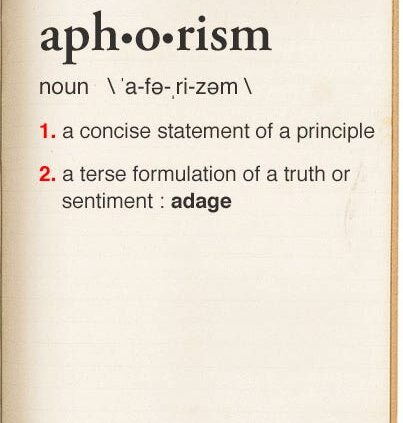Preaching With Aphorisms Adds Freshness
Preaching With Aphorisms Adds Freshness
We’re exploring how to keep your messages fresh. The first in this series of blog posts can be found here. Today we are going to consider that preaching with aphorisms adds freshness to your messages.
What’s An Aphorism, Anyway?
Here’s the dictionary definition of an aphorism from the Cambridge Dictionary:
a short clever saying that is intended to express a general truth
The root of the word aphorism is in the Greek, and it means “to set apart”, to “separate”. In other words, an aphorism sets an idea apart.
You’ll recognize many of these common aphorisms, I believe:
- Youth is a blunder; Manhood a struggle; Old age regret. [Benjamin Disraeli]
- The man who removes a mountain begins by carrying away small stones. [William Faulkner]
- Life’s tragedy is that we get old too soon and wise too late. [ Benjamin Franklin]
- All is fair in love and war.
- Better safe than sorry.
- An apple a day keeps the doctor away
- You can lead a horse to water, but you can’t make him drink.
- A stitch in time, saves nine.
How Does Using Aphorisms Add Freshness
There is a reality that you experience as a preacher that could be discouraging, if not for the Holy Spirit. Here’s the reality: people don’t remember much of your sermons. One survey showed that right after a ten minute presentation, people remember only 50% of what you have said. The next day it is down to 25%. A week later, it’s 10%.
Preaching with aphorisms adds freshness to your messages and helps people remember.
So, how does an aphorism help? It gives people something that sticks in their minds.
What’s Going On Beyond What’s Going On?
 One of the most powerful messages I’ve ever heard was preached by a man named Jim Scott. The passage he used for his message was the story of Elisha when surrounded by an army. His servant couldn’t see the heavenly armies, and so, Elisha prayed that the servant’s eyes would be opened. 2 Kings 6. Suddenly, the servant could see a reality beyond the reality of the senses.
One of the most powerful messages I’ve ever heard was preached by a man named Jim Scott. The passage he used for his message was the story of Elisha when surrounded by an army. His servant couldn’t see the heavenly armies, and so, Elisha prayed that the servant’s eyes would be opened. 2 Kings 6. Suddenly, the servant could see a reality beyond the reality of the senses.
Scott told about his conversion after watching the movie, The Exorcist. It was that movie that made him aware that there two kinds of reality: the one that we see, feel, touch, hear and taste, the reality of our senses; but there was another reality, one that we can’t see, but it real. The title of his message was “What’s going on beyond what’s going on?” That phrase was repeated throughout the message, and I remember it 20 years later.
An aphorism like that catches peoples’ attention, and gives them something to think about.
“We’re more powerful than the enemy”. A preacher used this aphorism at a stadium event that I attended many years ago. He was reflecting on Paul’s message that we have divine weapons to demolish strongholds.” (2 Corinthians 10:4)
His point was that we shouldn’t hesitate to take on the Enemy in our city, so he kept repeating these words, and it stuck.
Jesus Used Aphorisms In His Messages
Someone has counted the number of aphorisms that Jesus spoke in his messages and came up with the number 133. Here are a few of them:
- What does it profit a person if they gain the whole world but lose their own soul?
- No one can serve two masters, for either they will hate the one and love the other, or they will hold to the one and despise the other.
- Ask and it will be given you, seek and you will find, knock and it will be opened to you.
The Purpose Statement As An Aphorism
 One of the best ways to create a fresh message is to think through the primary point, or purpose statement of your message. What is it that you want your hearers to remember? Then turn that into an aphorism. Your hearers’ ears will perk up, and they will remember.
One of the best ways to create a fresh message is to think through the primary point, or purpose statement of your message. What is it that you want your hearers to remember? Then turn that into an aphorism. Your hearers’ ears will perk up, and they will remember.
You need time to think through these things. That’s one of the reasons you must take time early in the week to prepare your message. Take your purpose statement and try to reframe it into an aphorism. This will take some creativity and time, but the results will be worth it, because preaching with aphorisms adds freshness to your messages and makes them memorable.



